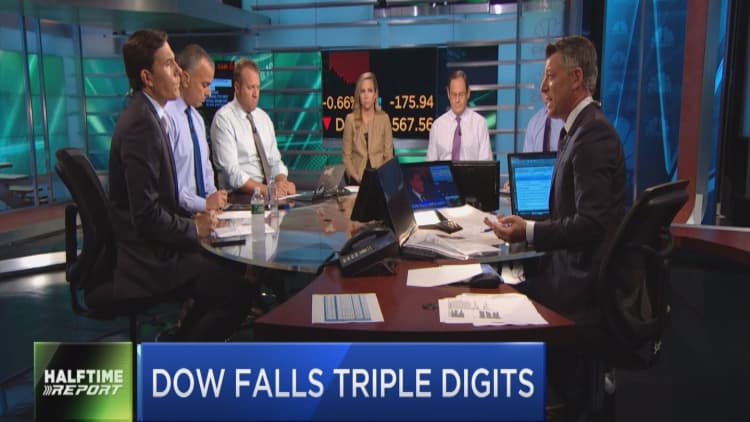
Stocks fell Monday on worries of more political turmoil out of the White House ahead of crucial midterm elections where the Republican party is trying to hold onto both houses of Congress. Equities were also under pressure by the cancellation of U.S.-China trade talks.
The Dow Jones Industrial Average closed 181.45 points lower at 26,562.05 and dropped nearly 200 points at its lows of the day. The declined 0.4 percent to 2,919.37. The Nasdaq Composite rose 0.1 percent to 7,993.25, however, as Netflix shares gained 2.3 percent. Boeing and General Electric were among the big losers.
Stocks began falling to session lows shortly after trading began on reports that Deputy Attorney General Rod Rosenstein was about to resign or be fired. The White House later said in a statement Rosenstein and President Donald Trump will meet on Thursday amid the conflicting reports.
"Certainly the fact that you have such contention within the administration is not the sort of stability markets like to see. To have a such a high-level official resign is a part of that," said Bruce McCain, chief investment strategist at Key Private Bank.
Larry McDonald, founder of the Bear Traps Report, said Rosenstein's resignation could lead to more trouble for the Republicans in the upcoming midterm elections.
"I can't see this helping the midterms for the Republicans and the Trump agenda will be frozen in ice and possibly reversed," he said. "If Rosenstein is gone, it emboldens Trump's base, but it's not going to help him with Democrats as well as middle-of-the-road voter that wants to give the Mueller investigation the benefit of the doubt."
An NBC-Wall Street Journal poll showed Democrats leading Republicans by 12 points on a generic ballot, a lead wide enough for Democrats to win control of not only the House, but possibly the Senate.
Equities had already been under pressure earlier as new tariffs on U.S. and Chinese goods took effect while both countries also cancelled trade talks.
The Wall Street Journal first reported late Friday that China had cancelled talks with the U.S. on trade as both countries impose tariffs on billions of dollars worth of their goods. The two sides were set to meet in order to dial back tensions, but the Journal reported that China rescinded a proposal to send two delegations to Washington. Other news outlets matched the Journal's reporting throughout the weekend.
On Monday, a 10 percent U.S. levy on $200 billion worth of Chinese goods came into effect. The 10 percent rate is also set to rise to 25 percent by year-end. China has retaliated, targeting duties on more than 5,000 American goods worth a total of $60 billion.
Tim Courtney, chief investment officer at Exencial Wealth Advisors, said the risk of a full-blown trade war between the U.S. and China is not being completely priced in by the market. "I think the market has expected trade disputes to get resolved. That's been the case for the most part, except for China," he said.
Boeing and Caterpillar both fell more than 1 percent. The two companies are thought of as bellwethers for trade given their exposure to overseas markets.
The move lower on Monday comes after the Dow and S&P 500 posted record highs on Friday and notched solid weekly gains.
"They did it in a very healthy way," said Art Hogan, chief market strategist at B. Riley FBR. He noted that money rotated out of defensive stocks and some of the high-flying tech shares into financials. "I think we can see another bid in financials if the 10-year can hold above 3 percent."
The benchmark 10-year Treasury note yield traded at 3.08 percent on Monday.
Energy shares rose, meanwhile, as Brent crude broke above $80 per barrel to hit its highest level since 2014 after OPEC leaders signaled they would not be boosting output immediately. The Energy Select Sector SPDR ETF (XLE) rose 1.5 percent.
"It's clear that the OPEC meeting didn't have a lot of talk about new supply coming," said Hogan. The boost is coming more from "the supply side, but demand is still strong, which is a positive" for oil and energy stocks.
Comcast outbid Twenty-First Century Fox on Saturday in a $39 billion takeover of U.K. broadcaster Sky, submitting a much higher bid in a three-round auction. On Monday, the U.K. broadcaster recommended its shareholders to accept an offer from Comcast. Comcast shares fell 6 percent while Fox's stock rose 1.5 percent.
Meanwhile, SiriusXM announced it would buy Pandora in a stock deal worth $3.5 billion. The deal initially sent Pandora shares ripping nearly 20 percent higher in the premarket but fell 1.2 percent in regular trading.
—CNBC's Michael Sheetz and John Melloy contributed to this report.



